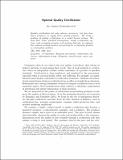Files in this item
Optimal quality certification
Item metadata
| dc.contributor.author | Zapechelnyuk, Andriy | |
| dc.date.accessioned | 2020-07-23T14:30:02Z | |
| dc.date.available | 2020-07-23T14:30:02Z | |
| dc.date.issued | 2020-06-01 | |
| dc.identifier.citation | Zapechelnyuk , A 2020 , ' Optimal quality certification ' , American Economic Review: Insights , vol. 2 , no. 2 , pp. 161-176 . https://doi.org/10.1257/aeri.20190387 | en |
| dc.identifier.issn | 2640-205X | |
| dc.identifier.other | PURE: 261745691 | |
| dc.identifier.other | PURE UUID: 4898f947-ec85-420a-a366-13d8511d9335 | |
| dc.identifier.other | ORCID: /0000-0001-5033-3848/work/77893893 | |
| dc.identifier.other | WOS: 000672747800002 | |
| dc.identifier.uri | https://hdl.handle.net/10023/20319 | |
| dc.description | Financial support from the Economic and Social Research Council Grant ES/N01829X/1 is gratefully acknowledged. | en |
| dc.description.abstract | Quality certification not only informs consumers, but also stimulates producers to supply better quality products. We study a problem of quality certification in a moral hazard setting. We show that, under standard assumptions, simple certification systems, such as quality assurance rule and pass-fail rule, are optimal. Our solution method involves interpreting the certification problem as a delegation problem. | |
| dc.language.iso | eng | |
| dc.relation.ispartof | American Economic Review: Insights | en |
| dc.rights | Copyright 2020 American Economic Association. All rights reserved. This work has been made available online in accordance with publisher policies or with permission. Permission for further reuse of this content should be sought from the publisher or the rights holder. This is the author created accepted manuscript following peer review and may differ slightly from the final published version. The final published version of this work is available at https://doi.org/10.1257/aeri.20190387 | en |
| dc.subject | Certification | en |
| dc.subject | Bayesian persuasion | en |
| dc.subject | Information disclosure | en |
| dc.subject | Information design | en |
| dc.subject | Delegation | en |
| dc.subject | Moral hazard | en |
| dc.subject | Career concerns | en |
| dc.subject | HB Economic Theory | en |
| dc.subject | T-NDAS | en |
| dc.subject | BDC | en |
| dc.subject | R2C | en |
| dc.subject.lcc | HB | en |
| dc.title | Optimal quality certification | en |
| dc.type | Journal article | en |
| dc.contributor.sponsor | Economic & Social Research Council | en |
| dc.description.version | https://doi.org/Postprint | en |
| dc.contributor.institution | University of St Andrews. School of Economics and Finance | en |
| dc.identifier.doi | https://doi.org/10.1257/aeri.20190387 | |
| dc.description.status | Peer reviewed | en |
| dc.date.embargoedUntil | 2020-06-01 | |
| dc.identifier.grantnumber | ES/N01829X/1 | en |
This item appears in the following Collection(s)
Items in the St Andrews Research Repository are protected by copyright, with all rights reserved, unless otherwise indicated.

